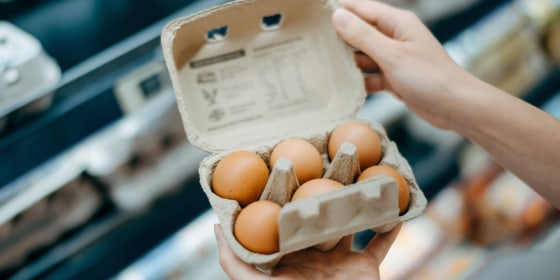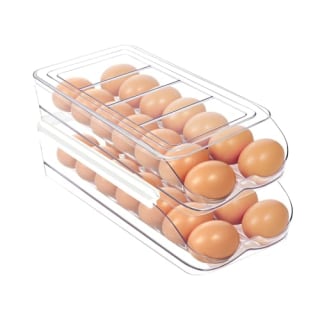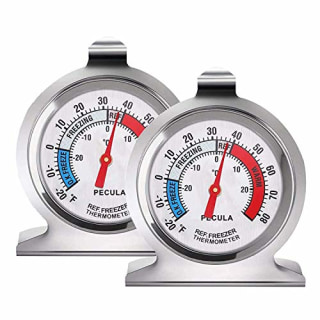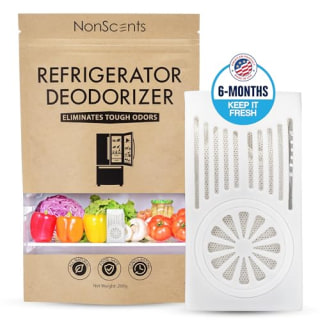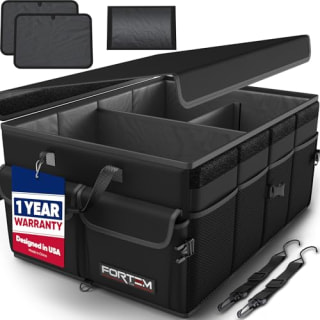We don’t always have the answers, but we have some people on speed dial who do — which is why we present to you our series FYI where we have experts explain how to wash strawberries, the best way to clean your coffee maker and how to maintain a cast-iron skillet.
Stocking up on pantry staples is one of the best ways I keep my grocery bill low. In recent years, that strategy has been a bit unreliable given the impacts of inflation. Eggs in particular have taken quite the hit, in part due to the recent bird flu outbreak. Plus, the average price of a dozen eggs is $5.54, which is $2.00 higher than a year ago, according to NBC News.
Given this and my experience reporting on food trends for years, I’ve been intent on finding new ways to keep my weekly grocery haul fresh for as long as possible — that way I can take less frequent trips to the store and stretch the life of some of these more expensive items. With this in mind, I spoke with chefs and food-safety experts to find out the best way to store eggs to extend their shelf life while still keeping them safe to eat and cook with.
SKIP AHEAD How to store eggs | The best egg storage products | How accurate are expiration dates for eggs? | How to tell if eggs are still fresh | Why do you need to refrigerate eggs? | How long do eggs last in the refrigerator? | Why trust NBC Select?
Want more from NBC Select? Sign up for our newsletter, The Selection, and shop smarter.
How to store eggs
To keep eggs fresh, a very cold environment is best, according to Kelly Fernandes, an instructor at Johnson & Wales’ College of Food Innovation & Technology. “For store-bought eggs, the best way to ensure they last as long as possible is to store them at 40°F or below in the coldest part of the refrigerator, typically the middle or back,” she says. Fernandes recommends against putting them in the door of the fridge since it isn’t as cold as the rest of the fridge and the temperature fluctuates more frequently, reducing their shelf life.
Additionally, you should keep the eggs enclosed in the carton they come in instead of transferring them to a reusable plastic container with an open top, according to Bridget Vickers, an instructor at the Institute of Culinary Education. (If you’re absolutely intent on transferring them, make sure you do so with a container that has an enclosed lid). “The best way to store eggs is in their original carton in the refrigerator,” she says. “The carton helps to protect them from absorbing strong odors and flavors from other foods while also preventing moisture loss.” Plus, paper or styrofoam cartons are softer than plastic and less likely to cause a crack in the shell, leading them to go bad more quickly, according to Vickers.
Lastly, you should always check to make sure none of the eggshells have cracks on them, both before and after buying them.
The best egg storage products
MesRosa Egg Holder
This stackable, BPA-free tray has a slight slope design that will automatically roll eggs forward when you take one out. That way you don't have to lift the lid and can use that vertical stacking space and put other kitchen essentials on top. The two trays can hold up to 28 eggs total (14 in each).
Pecula 2 Pack Refrigerator Thermometer
These will measure refrigerator temps ranging from -20 degress to around 80 degrees Farenheit that way you can ensure your eggs stay cold and therefore as fresh for as long as possible. The analog thermometers have a hook panel design that you can hang or place in different positions based on your fridge's layout. It's also made of stainless steel material that's generally easy to care for and quite durable over time.
NonScents Refrigerator Deodorizer
This deodorizer helps remove lingering scents from your fridge that way your eggs don't absorb them. Instead of masking any scents, this is designed to eliminate odor on a molecular level, according to the brand. At four inches tall, it's quite compact, too.
Fortem Car Trunk Organizer
This collapsible, multicompartment organizer will help you keep your eggs safe and intact when transporting them back from the grocery store. It has nonslip strips to prevent the organizer sliding and also has adjustable straps to secure it to your trunk.
How accurate are expiration dates for eggs?
Expiration dates can sometimes be a helpful guide for freshness, but they aren’t always hard deadlines, according to Fernandes. “Eggs are typically considered safe to eat well beyond the printed ‘sell-by’ or ‘expiration’ dates if stored correctly,” she says. “When stored at 40°F or below, whole, uncracked eggs can last up to four weeks (or even longer) after the date marked on their cartons.”
Plus, it’s important to know what specific expiration dates actually means to avoid food waste, according to Elisa Maloberti, manager of partner innovation and food safety at the American Egg Board. “The ‘best by’ date reflects peak quality, not safety,” she says. “As eggs age, whites thin, yolks flatten, and membranes weaken, but these changes don’t indicate spoilage.”
How to tell if eggs are still fresh
Aside from going off of the expiration date on your carton of eggs, there are a few different ways to tell if eggs are still okay to eat, according to Fernandes. Here are the methods below:
Float test
This test calls for a medium-size bowl and tap water. “Gently place an uncracked egg into a bowl of room-temperature water,” says Fernandes. “Fresh eggs will sink and lay on their sides, while older eggs will float upright [due] to the expansion of the air pocket inside.”
Shake test
For this method, simply hold the egg near your ear and gently shake with one hand. “If you do not hear any sounds, the egg is fresher. A noticeable sloshing sound indicates the egg is older.”
Visual test
Start with a large flat plate and crack the egg on to it gently. “A fresh egg will have a thick, firm white with a slight cloudiness, while an older egg will have a thinner, waterier white,” says Fernandes.
Smell
Pay attention to any odors after cracking the eggs. “Eggs that have gone bad will give off an unmistakable rotten (sulfuric) smell when cracked open,” says Fernandes. “A visual inspection can also help, check for small cracks and/or any indication of mold on the shell.”
Why do you need to refrigerate eggs?
If you’ve been to grocery stores in Europe, you may notice that not all of them refrigerate eggs. Given how eggs in the United States are processed, refrigeration is very much necessary to prevent the growth of bacteria, including salmonella, according to the United States Department of Agriculture (USDA). When eggs are washed to remove bacteria, the natural coating, known as the “cuticle,” deteriorates, so the egg shell is less protected, according to the USDA Egg Grading Manual.
How long do eggs last in the refrigerator?
It’s crucial to keep eggs refrigerated in the coldest area of your fridge starting the first day you buy them if you want them to last as long as possible, according to Maloberti. “This helps maintain freshness for four to five weeks beyond the pack date (the date the egg was placed in the carton, expressed as a Julian date) or about three weeks after purchase.”
Meet our experts
At NBC Select, we work with experts who have specialized knowledge and authority based on relevant training and/or experience. We also take steps to ensure all expert advice and recommendations are made independently and without undisclosed financial conflicts of interest.
- Kelly Fernandes is a culinary instructor at Johnson & Wales’ College of Food Innovation and Technology, with experience in both cooking and pastry.
- Bridget Vickers is a senior chef instructor at the Institute of Culinary Education’s Los Angeles campus, with experience in bread and pastry.
- Elisa Maloberti, manager of partner innovation and food safety at the American Egg Board.
Why trust NBC Select?
I’m commerce editor at NBC Select, where I write about home and kitchen-related topics, including food storage. I’ve written about the best stainless steel cookware, how to clean a cast-iron skillet, and have reported on the food and cooking space for almost ten years. For this story, I spoke with culinary school instructors and a member of the American Egg Board, and consulted information from the USDA and the U.S. Bureau of Labor Statistics.
Catch up on NBC Select’s in-depth coverage of tech and tools, wellness and more, and follow us on Facebook, Instagram, Twitter and TikTok to stay up to date.
